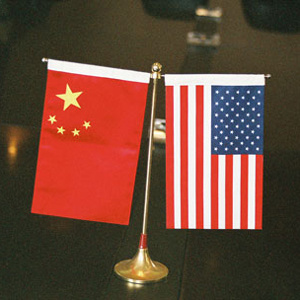Chinese Apathy, American Urge
Washington is not fond of Beijing’s stance aversion towards new anti-Iran sanctions. By Ebrahim Mottaqi

United States and other global powers will "move away from the engagement track, which has not produced the results that some had hoped for, and move towards the pressure and sanctions track,” US Secretary of State Hillary Clinton said yesterday on her visit to Paris. These remarks come while Washington urges Beijing to get on board with tighter sanctions against Iran. Ebrahim Mottaqi, American affairs analyst has commented on the new developments:
To analyze US-China relations, first we should take into account some basic points. China is highly critical of US policy in Southeast Asia –particularly its cordial ties with Taiwan- and its support for Dalai Lama, spiritual leader of Tibetans. But China is completely integrated into the global capital market today and to sustain its economic growth, the country heavily relies on cooperation with US and other Western powers. This is the factor that limits the reactions of Asian powerhouse to a narrow range.
During the recent years, Iran’s nuclear program has brought changes to relations between global powers. China and Russia’s apathy towards United States’ Iran policy has kept Washington from imposition of full pressure on Tehran. Nevertheless, beneath the surface, China and Russia also follow a policy of deterrence and containment towards Iran.
Current circumstances (economic crisis, war in Afghanistan and Iraq) stop Americans from launching a military operation against Iran. Thus, Americans are not planning to develop the next resolution within the frames of Article 42 of UN Charter. Articles 39, 40 and 41 will remain as the United States main source in predictable future, that is they will increase diplomatic pressures through transnational organizations such as UN Security Council.
Although Beijing continues its anti-sanction policy as it believes Iran has demonstrated cooperation in cases such as the Geneva talks, history has shown that China and Russia have never confronted US policies explicitly. At times they use sanctions as a bargaining chip and in other times they try to dilute US measures. But as I mentioned, at the end of the day, China and US agree on their Iran macropolicy, i.e. deterrence and containment.
February will give Beijing and Washington a better opportunity to discuss a new resolution against Iran, as the media vibe media prompt this impression. Diplomatic developments will show in February whether Iran will return to the table of negotiations (Geneva II) or faces a new sanction passed by UN Security Council.
To analyze US-China relations, first we should take into account some basic points. China is highly critical of US policy in Southeast Asia –particularly its cordial ties with Taiwan- and its support for Dalai Lama, spiritual leader of Tibetans. But China is completely integrated into the global capital market today and to sustain its economic growth, the country heavily relies on cooperation with US and other Western powers. This is the factor that limits the reactions of Asian powerhouse to a narrow range.
During the recent years, Iran’s nuclear program has brought changes to relations between global powers. China and Russia’s apathy towards United States’ Iran policy has kept Washington from imposition of full pressure on Tehran. Nevertheless, beneath the surface, China and Russia also follow a policy of deterrence and containment towards Iran.
Current circumstances (economic crisis, war in Afghanistan and Iraq) stop Americans from launching a military operation against Iran. Thus, Americans are not planning to develop the next resolution within the frames of Article 42 of UN Charter. Articles 39, 40 and 41 will remain as the United States main source in predictable future, that is they will increase diplomatic pressures through transnational organizations such as UN Security Council.
Although Beijing continues its anti-sanction policy as it believes Iran has demonstrated cooperation in cases such as the Geneva talks, history has shown that China and Russia have never confronted US policies explicitly. At times they use sanctions as a bargaining chip and in other times they try to dilute US measures. But as I mentioned, at the end of the day, China and US agree on their Iran macropolicy, i.e. deterrence and containment.
February will give Beijing and Washington a better opportunity to discuss a new resolution against Iran, as the media vibe media prompt this impression. Diplomatic developments will show in February whether Iran will return to the table of negotiations (Geneva II) or faces a new sanction passed by UN Security Council.

